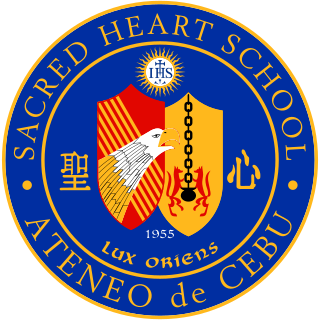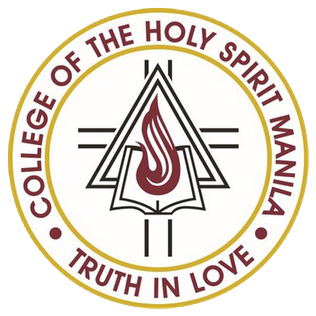
Mawab, officially the Municipality of Mawab, is a 3rd class municipality in the province of Davao de Oro, Philippines. According to the 2020 census, it has a population of 39,631 people.

The Department of Education is the executive department of the Philippine government responsible for ensuring access to, promoting equity in, and improving the quality of basic education. It is the main agency tasked to manage and govern the Philippine system of basic education. It is the chief formulator of Philippine education policy and responsible for the Philippine primary and secondary school systems. It has its headquarters at the DepEd Complex in Meralco Avenue, Pasig.
Regional Science High School Union (RSHS-Union) is a specialized system of public secondary schools in the Philippines, established during the academic year 1994-1995. It is operated and supervised by the Department of Education, with a curriculum heavily focusing on math and science. It remains within the ambit of the Department of Education, unlike the specialized science high school system of national scope, the Philippine Science High School.
Education in the Philippines is provided by public and private schools, colleges, universities, and technical and vocational institutions in the country. Funding for public education comes from the national government. For the academic year 2017–2018, about 83% of K–12 students attended public schools and about 17% either attended private schools or were home-schooled.

Quezon National High School (QNHS) is a major public secondary science high school in Brgy. Ibabang Iyam, Lucena City, Philippines. It is one of the largest contingent national high schools in the Philippines, both by size and by population, with more than 11,000 enrollees from Grades 7 to Grade 12.
The Science, Technology, Engineering and Mathematics Education Program is a science and mathematics-oriented curriculum devised for high schools in the Philippines. The STEM program is offered by specialized high schools, whether public or private, supervised by the Department of Education. Currently, there are 110 high schools offering the STEM program, the majority being public. It was piloted in 1994 by the Department of Science & Technology (DOST).

Saint Mary's College of Quezon City also referred to by its acronym SMCQC or as St. Mary's College, is a private Catholic basic and higher education institution for both boys and girls administered by the Religious of the Virgin Mary in Mother Ignacia Avenue, Quezon City, Philippines. It was established in 1725 by the RVM Sisters.

The University of Southern Philippines Foundation (USPF) is a private, non-sectarian university in Cebu City, Philippines. USPF boasts of diverse program offerings, a highly competent teaching force, and complete facilities to ensure that its students receive quality instruction and skills-based education. As a testament to its pursuit of excellence, USPF’s programs have been granted accreditations by the Philippine Association of Colleges and Universities Commission on Accreditation (PACUCOA). USPF is also among the few institutions in Region 7 to have the Level III accreditation status.

Sacred Heart School – Ateneo de Cebu (SHS-AdC), formerly known as Sacred Heart School for Boys (SHS-B), is a private, Catholic, Chinese-Filipino college-preparatory, K-12 school run by the Philippine Province of the Society of Jesus in Mandaue City, Philippines. It was established in 1955 with a curriculum that includes a Chinese language course.
The University of Santo Tomas College of Education, popularly known as "UST-Educ", is the teacher education, nutrition and dietetics, food technology, and library and information science school of the University of Santo Tomas, the oldest and the largest Catholic university in Manila, Philippines. It was established in 1926 at Intramuros, Manila.
Caraga Regional Science High School is a public school in San Juan, Surigao City, Philippines. It is the leading school in the Division of Surigao City with high MPS during the annual National Achievement Tests (NAT), and has been consistent in making its name in Division, Regional, National and International level contests.

The Palarong Pambansa is an annual multi-sport event involving student-athletes from 17 regions of the Philippines. The event, started in 1948, is organized and governed by the Department of Education.

Dili International School is an international English-language school situated in Dili, the capital of East Timor. Dili International School is accredited with the International Baccalaureate Organisation, the Victorian Curriculum and Assessment Authority, and the Timor-Leste Ministry of Education, Youth and Sports.
The University of St. La Salle–Integrated School (USLS-IS), located in La Salle Avenue-Montelibano Drive and in Villa Lucasan Subdivision, Brgy. Mandalagan, Bacolod, Philippines, is a Catholic primary and secondary school run by the De La Salle Brothers. Established in 1952 as La Salle - Bacolod, it is the second oldest campus founded by the congregation in the country. The university is a member of De La Salle Philippines, a network established in 2006 comprising 17 Lasallian institutions in the country. It is under the supervision and administration of University of St. La Salle.

The School of Our Lady of Atocha commonly known as SOLA, is a non-stock and non-profit Catholic school located in Magsaysay, Alicia, Isabela, Philippines. It was founded in 1980 and is under the direction of the Diocesan School System of the Diocese of Ilagan, Isabela. There are over 1,500 students enrolled annually.

The Notre Dame University, also referred to by its acronym NDU, is a private Catholic research basic and higher education institution run by the Missionary Oblates of Mary Immaculate in Cotabato City, Maguindanao, Philippines.It was founded by the Oblates in 1948 and has been a member of the Notre Dame Educational Association, a group of schools in the Philippines named Notre Dame. The Association is under the patronage of the Blessed Virgin Mary.

Notre Dame of Kidapawan College, also referred to by its acronym NDKC is a private, Catholic basic and higher education institution run by the Marist Brothers of the Schools or FMS , a Catholic religious order from France. It was founded by Bishop Gerard G. Mongeau, OMI, DD in 1948. It offers elementary, high school, undergraduate and postgraduate courses. It is located in Kidapawan City, Cotabato, Philippines. NDKC has been a member of the Notre Dame Educational Association, a group of schools named Notre Dame in the Philippines which is under the patronage of the Blessed Virgin Mary.

The College of the Holy Spirit Manila, or simply CHSM, was a private, Catholic education institution founded and ran by the Missionary Sisters Servants of the Holy Spirit in Manila, Philippines. Founded in 1913, College of the Holy Spirit Manila was established originally as Holy Ghost College through the invitation of then Manila Archbishop Jeremias Harty. Located originally at Legarda Street, the present campus is now located in the historic Mendiola Street, inside the Malacañang Palace Complex. It is one of the schools which comprises the Mendiola Consortium (MC) for academic cooperation along with Centro Escolar University Manila, La Consolacion College Manila, San Beda College Manila, and St. Jude Catholic School.

Tagum National Trade School (TNTS) situated at Apokon, Tagum City, is the only vocational of the five main public high schools in Tagum City, under the jurisdiction of the DepEd Division of Tagum City and Technical Education and Skills Development Authority. It was founded on August 1, 1972. The institution cater students from Tagum City and the province of Davao del Norte.
The Ibalik ang Philippine History sa High School Movement is a collective term for an educational reform movement in the Philippines. It is a loose movement advocating the reinstatement of Philippine History as a dedicated Social Studies subject in the high school curriculum of the Philippines.













